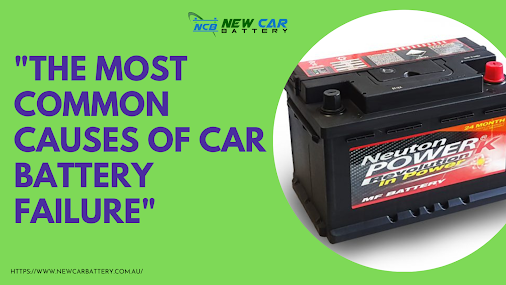"The Most Common Causes of Car Battery Failure"
Car batteries are an essential component
of every vehicle as they provide the necessary power to start the engine and
run the electrical systems. However, car batteries can also be one of the most
common sources of trouble for drivers. In this blog, we will explore the most
common causes of new car battery failure and what you can do to prevent
them.
Age: One of the most common causes of
car battery failure is simply age. Car batteries have a limited lifespan,
usually between 3-5 years, after which they start to lose their ability to hold
a charge. This means that even if you use your car regularly, you may still
need to replace the battery.
Extreme Temperatures: Both
extremely hot and cold temperatures can take a toll on your car battery. During
hot weather, the battery fluid can evaporate, reducing its ability to hold a
charge. On the other hand, cold temperatures can cause the battery to discharge
faster and become less efficient.
Leaving the Lights On: Leaving
the lights on is one of the most common reasons for car battery failure. This
is because the lights, as well as other electrical systems, continue to drain
the battery even when the engine is not running.
Short Trips: Taking short trips in your car
can also lead to battery failure. This is because the alternator doesn't have
enough time to recharge the battery during these trips, leading to a gradual
loss of power.
Corroded Battery Terminals: Over
time, the battery terminals can become corroded, reducing the flow of
electricity from the battery to the car's electrical system. This can cause a
number of issues, including battery failure.
Loose Connections: If the connections
between the battery and the rest of the car's electrical system are loose, this
can cause a reduction in the flow of electricity, leading to battery failure.
To prevent car battery failure, it's important to regularly check the
battery's connections, ensure the battery terminals are clean, and replace the
battery if it's over 3 years old. In addition, avoiding leaving the lights on
and taking longer trips will help extend the battery's lifespan.
In conclusion, car battery failure is a common problem, but it can often
be prevented by taking a few simple steps. By following the tips outlined in
this blog, you can ensure that your car battery stays in good condition and
provides the necessary power to keep your vehicle running smoothly.
Lack of Maintenance
Lack of maintenance refers to the neglect of upkeep or care for a
particular object, system, or structure. This neglect can have serious
consequences, including decreased efficiency, increased risk of failure, and
even complete breakdown. In many cases, lack of maintenance can be easily
prevented with a little effort and attention, but it is often a result of a
lack of understanding, resources, or simply neglect.
For example, in the case of a building, lack of maintenance can result
in structural damage, which can cause the building to become unstable and
potentially hazardous. This can include the growth of mold and mildew, which
can cause health problems, as well as damage to the building's electrical and
plumbing systems.
In the case of a vehicle, lack of maintenance can result in decreased
fuel efficiency, increased emissions, and a higher risk of breakdowns. Regular
maintenance, such as oil changes and tire rotations, can help to keep a vehicle
running smoothly and prevent costly repairs down the road.
In technology, lack of maintenance can result in outdated software and
hardware, which can lead to decreased efficiency, security vulnerabilities, and
eventually, system failure. Regular software updates and hardware maintenance
can help to prevent these issues and keep systems running smoothly.
Overall, lack of maintenance can have serious consequences, but it is
often easily preventable with a little effort and attention. By taking the time
to perform regular maintenance, individuals and organizations can help to
ensure the longevity, safety, and efficiency of their possessions and systems.

.png)

.png)
Comments
Post a Comment